Complete Solutions to Example of chapter Mock Test 25: PHYSICS of Class 12 book with complete answers and questions
| Class 12 | PHYSICS |
| Chapter | Mock Test 25: PHYSICS |
| AAKASH INSTITUTE | Example |
| Number Of Questions | 59 |
| Academic Year | 2023-24 |
Three charges 2 `mu`C , -4 `mu`C and 8 `mu`C are places at the three vertices of an equilateral triangle of side 10 cm. The potential at the centre of triangle is
View SolutionA charge -3 `mu`C is placed at one corner of cube of side 9 cm . The potential at a point P which diagonally opposite as shown in fugure is
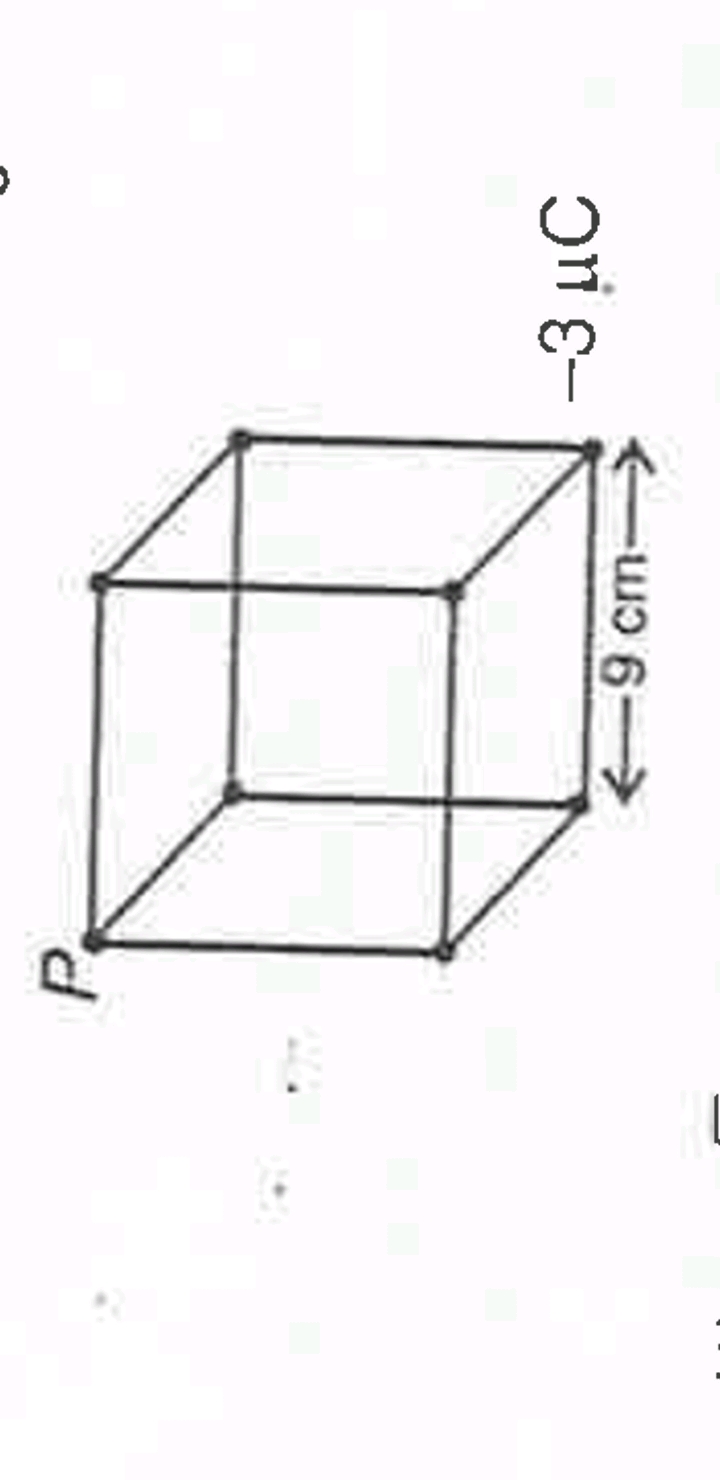
View SolutionTwo charges -4 `mu`C and 8 `mu`C are 27 cm apart. The distance from the first charge on line of joining between two charges where electric potential would be zero is
View SolutionAn electric field `vec E=20y hat j` exist in space . The potential at (5 m, 5 m) is taken to be zero. The potential at origin is
View SolutionA body moves from point A to B under the action of a force, varying in magnitude as shown in figure. Obtain the work done. Force is expressed in newton and displacement in meter.
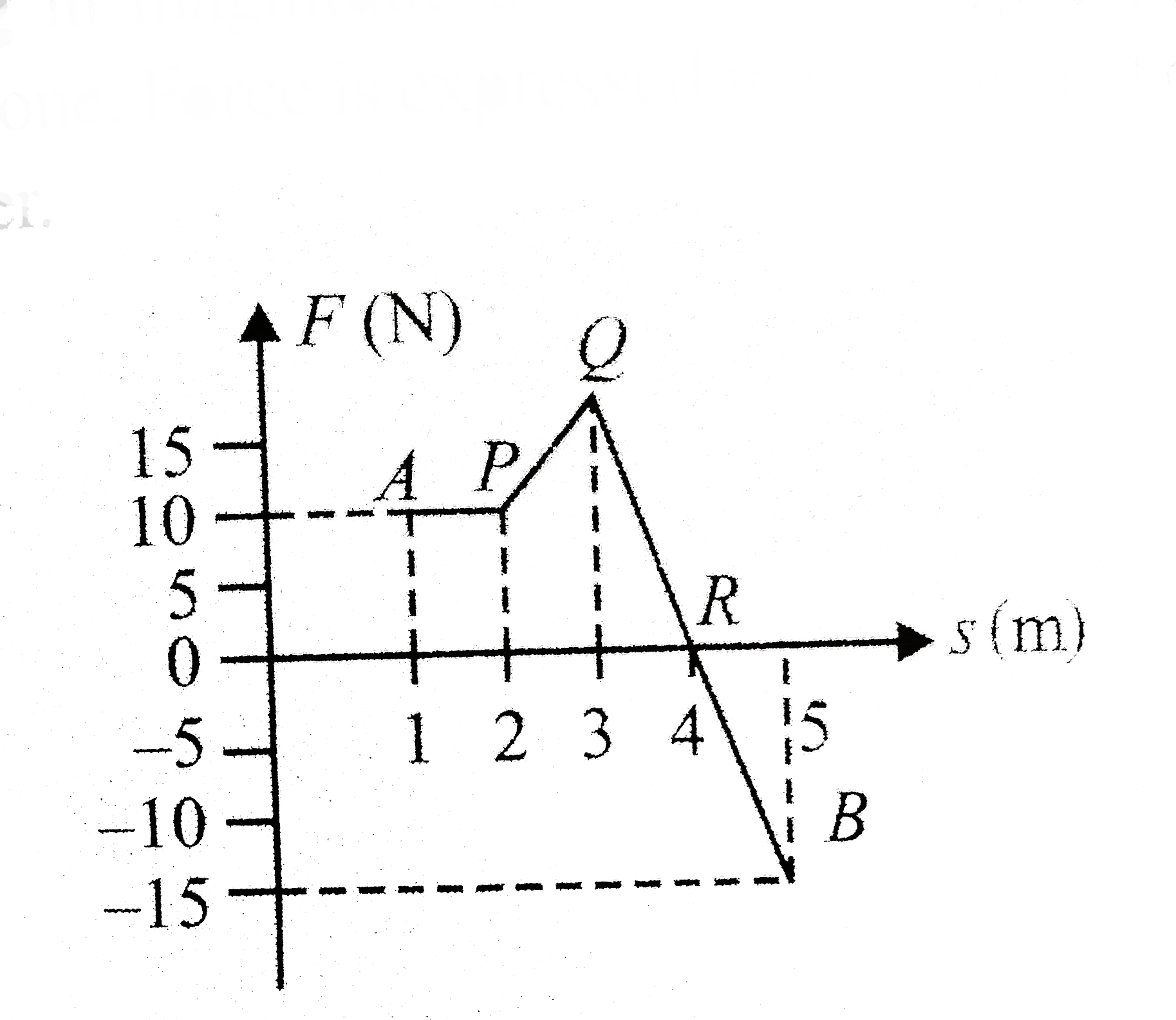
View SolutionPotential of electric ield vector is given by V= 9 `(x^3 - y^3 )`, (where , xand y are cartesian Co-ordinates). The electric field strenth vector is
View SolutionIn the figure given below , the zero potential is taken at infinity. The work done in moving a unit charge from A to B is , Where `V_A right arrow` potential at point A, ` V_B right arrow` potential at point B

View SolutionThe electric field strenth vector is given by E=`2.5x hat I + 1.5y hat`.The potential at point (2,2,1) is (considering potential at origin to be zero)
View SolutionTwo point charges `4 mu C and -2 mu C` are separated by a distance of 1m in air. Calculate at what point on the line joining the two charges is the electric potential zero ?
View SolutionTwo electric dipoles are placed parallel to each other as shown in figure. The potential at apoint P is

View SolutionThe potential due to a short electric field dipole moment`2xx10^-6` C-m along its axis point 4 m from dipole is
View SolutionSix charges , `q_1 = +1` `mu`C , `q_2 = +3` `mu`C , `q_3 = +4` `mu`C , `q_4 = -2` `mu`C , `q_5 = -3` `mu`C and `q_6 = -3` `mu`C are placed on a sphee of radius 10 cm. The potential at centre of sphere is
View SolutionA test charge q is taken from point A to B in electrostatic field of other charge Q as shown in figure. The reletion between potetial energy and potential ( between points A and B) is
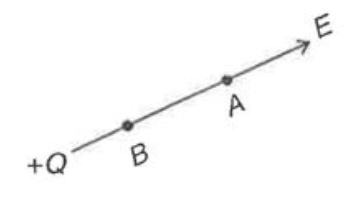
View SolutionTwo charges are placed s shown in figure below. The potential at point P is
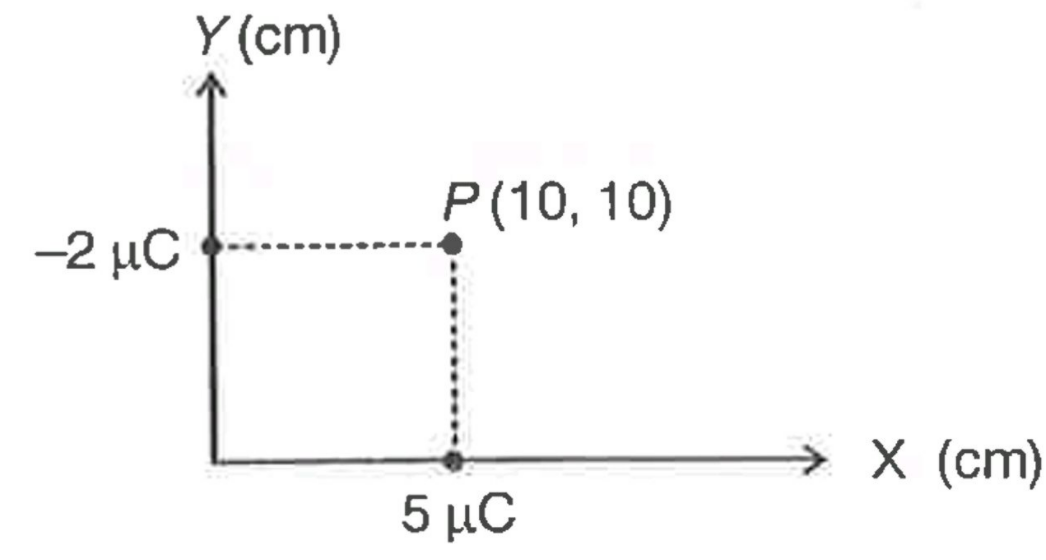
View SolutionTwo Charges 5 `mu`C and 20 `mu`C are placed on two concentric circes of radius 10 cm and 20 cm respectively lying in x-y plane . The potential at centre is
View SolutionThree charges `2q,-q,-q` are located at the vertices of an equilateral triangle. At the centre of the triangle,
View SolutionThree concentric spherical shells have radii `a, b` and `c(a lt b lt c)` and have surface charge densities `sigma, -sigam` and `sigma` respectively. If `V_(A), V_(B)` and `V_(C)` denote the potentials of the three shells, then for `c = a + b`, we have
View SolutionTwo charges +6 'mu'C and -6 'mu'C are placed 15 cm apart as shown . At what distance from A to its right, the electrostatic potential is zero (distance in cm)

View SolutionThe electric potential at a point (x,y,z) is given by `V =- x^(2) y - xz^(3) +4` The electric field E at that points is
View SolutionThe electric field in a certain region is given by `E=5 hat(i)-3hat(j) kv//m`. The potential difference `V_(B)-V_(A)` between points a and B having coordinates (4, 0, 3) m and (10, 3, 0) m respectively, is equal to
View SolutionTwenty seven drops of mercury are charged simultaneously to the same potential of 10V. What will be the potential if all the charge drops are made to combine to form one large drop? Assume the drops to be spherical.
View SolutionTwo charged spheres of radii `R_(1) and R_(2)` having equal surface charge density. The ratio of their potential is
View SolutionFour electric charges `+q,+q,-q and -q` are placed at the corners of a square of side `2L`. The electric potential at point A, midway between the two charges `+q and +q` is
View SolutionEquipotential surfaces associated with an electric field which is increasing in magnitude along the x-direction are
View SolutionA regular hexagon of side `a` has a charge Q at each vertex. Potential at the centres of hexagon is (k= `(1/4piepsilon_0)`)
View SolutionFigure shows three points A, B and C in a region of uniform electric field `vec(E)`. The line AB is perpendicular and BC is parallel to the field lines. Then which of the following holds good?
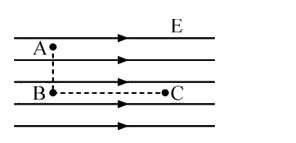
where and represent the electric potential at the points A, B and C respectively
View SolutionTwo thin wire rings each having radius R are placed at distance d apart with their axes coinciding. The charges on the two are `+Q` and `-Q`. The potential difference between the centre so the two rings is
View SolutionThe work done to move a charge along an equipotential from A to B
View SolutionEquipotentials at a great distance from a collection of charges whose total sum is not zero are approximately.
View SolutionFigure shows ome equipotential lines distributed in space. A charged object is moved from point A to point B.

View SolutionWhen the separation between two charges is increase the electric potential energy of the charges.
View SolutionMark the correct statement :.
View SolutionA negetive charge is moved by an external agent in the direction of electric field. Then

View SolutionCharges`-q , Q, and -q` are placed at an equal distance on a straight liner. If the total potential energy of the system of three charges is zero, then find the ratio `Q//q`.
 .
.
View SolutionAn alpha particle is accelerated from rest through a potential difference of 100 volt. Its final kinetic energy is
View SolutionTwo point charges `q_1 and q_2` are placed in an external uniform electric field as shown in figure. The potential at the location of `q_1 and q_2` are `V_1 and V_2`, i.e., `V_1 and V_2` are potentials at location of `q_1 and q_2` due to external unspecified charges only. Then electric potential energy for this configuration of two charged particle is
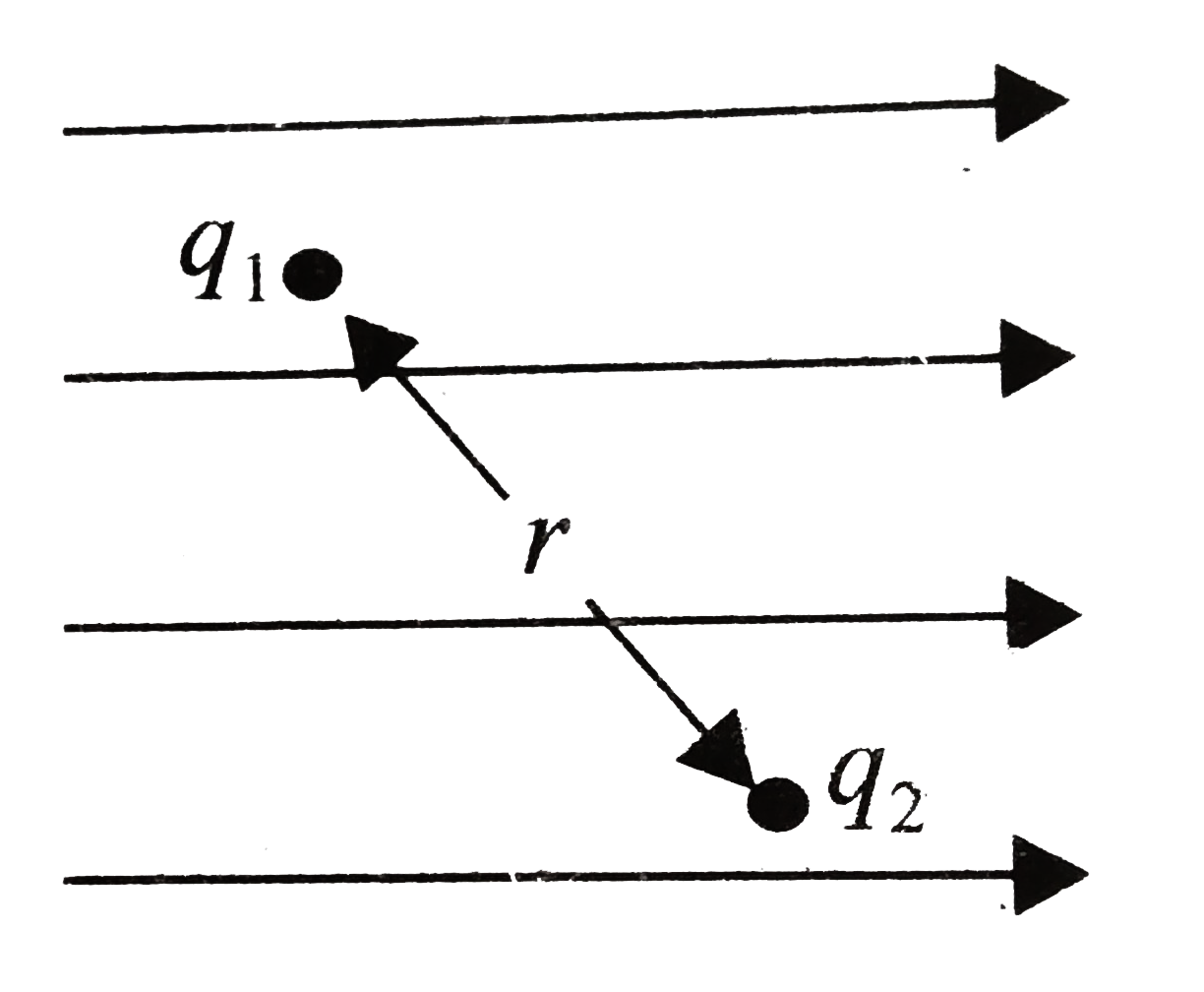
View SolutionJust outside a sharp point on a conductor we will have a larger `"______________"` than just outside gradually curving places on the conductor.
View SolutionA and B are two concentric spherical shells. If A is given a charge `+q` while B is earthed as shown in figure then
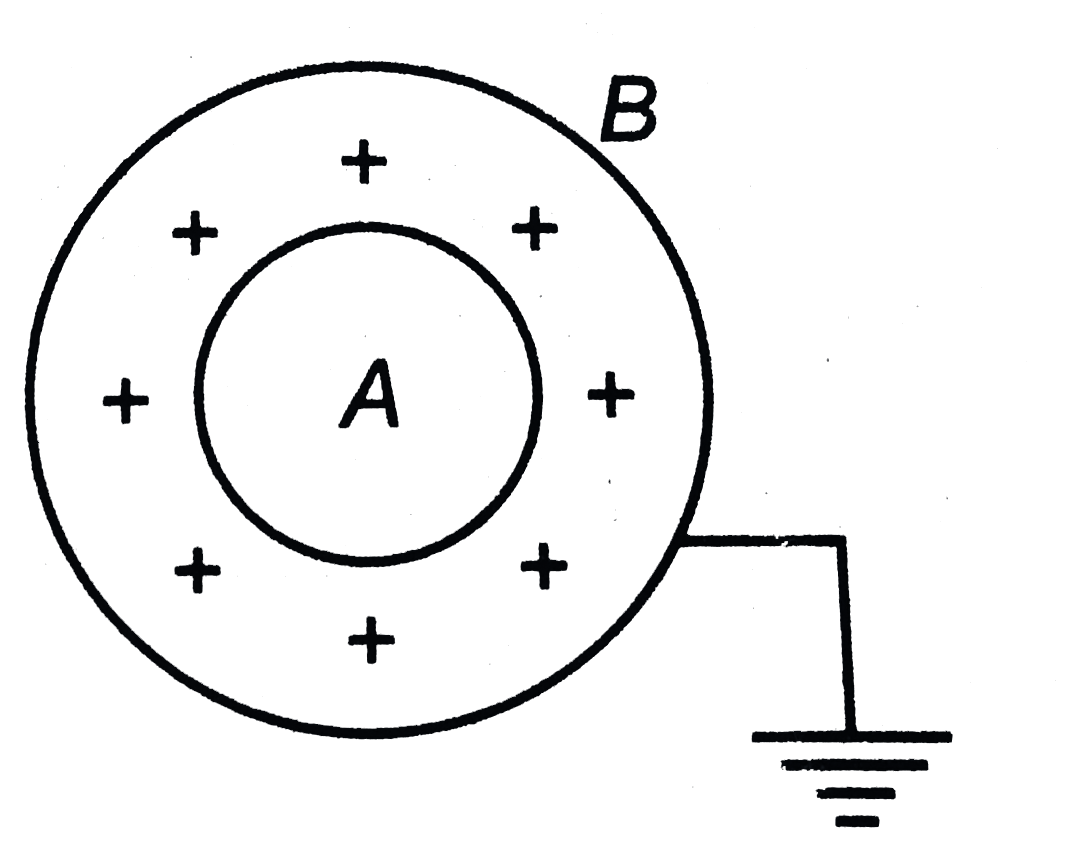
View SolutionCharges `Q, 2Q`, and `-Q` are given to three concentric conducting sphereical shells `A, B` and `C` respectively as shown in figure. The ratio of charge on the inner and outer surface of shell C will be
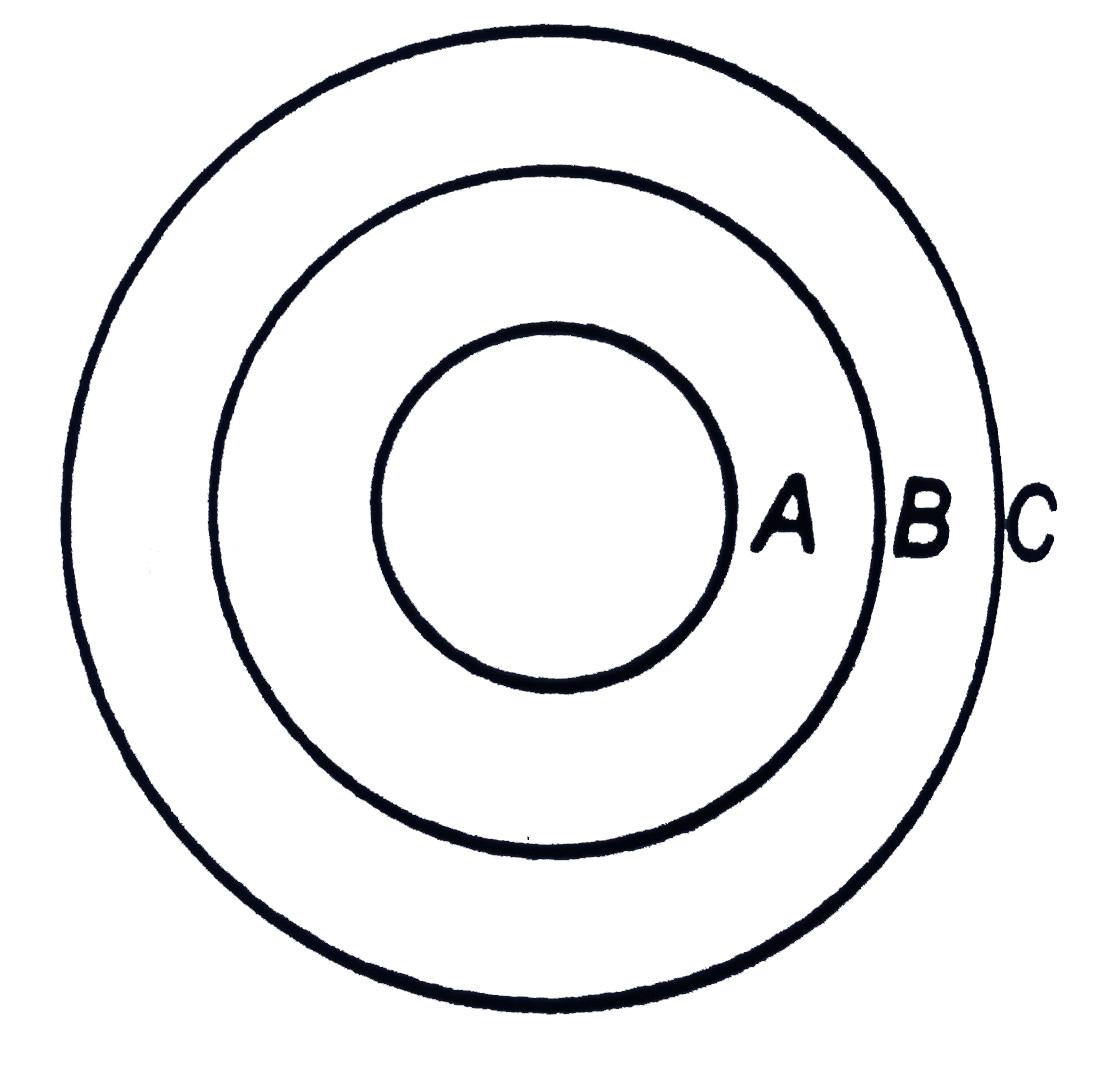
View SolutionTwo parallel metallic pltes , each of tharea A are kept as shown in the figure and charges -2Q and 4Q are given to them. Edge effects are negligeble . The charges on the surface I and III are respectively

View SolutionA particle of mass m and charge -q circulates around a fixed charge q in a circle radius under electrostatic force. The total energy of the system is (k= `(1/4piepsilon_0)`)
View SolutionThe work in rotating electric dipole of dipole moment p in an electric field E through an angle `theta` from the direction of electric field, is:
View SolutionA solid conducting sphere of radius 10 cm is enclosed by a thin metallic shell of radius 20 cm. A charge `q = 20 muC` is given to the inner sphere. Find the heat generated in the process, the inner sphere is connected to the shell by a conducting wire.
View SolutionTwo particles X and Y, of equal masses and with unequal positive charges, are free to move and are initially far away from each other. With Y at rest, X begins to move towards it with initial velocity u. After a long time, finally:
View SolutionFor the situation in figure mark the correct statement

View SolutionThe capacity of parallel plate capacitor depends on
View SolutionA parallel plate capacitor (without dielectric) is charged by a battery and kept connected to the battery. A dielectric salb of dielectric constant `'k'` is inserted between the plates fully occupying the space between the plates. The energy density of electric field between the plates will:
View SolutionA capacitor of capacitance `C` is charged to a potential `V`. The flux of the electric field through a closed surface enclosing the capacitor is
View SolutionIf n drops, each of capacitance C and charged to a potential V, coalesce to form a big drop, the ratio of the energy stored in the big drop to that in each small drop will be
View SolutionPlates of area A are arranged as shown. The distance between each plate is d , the net capacitance is
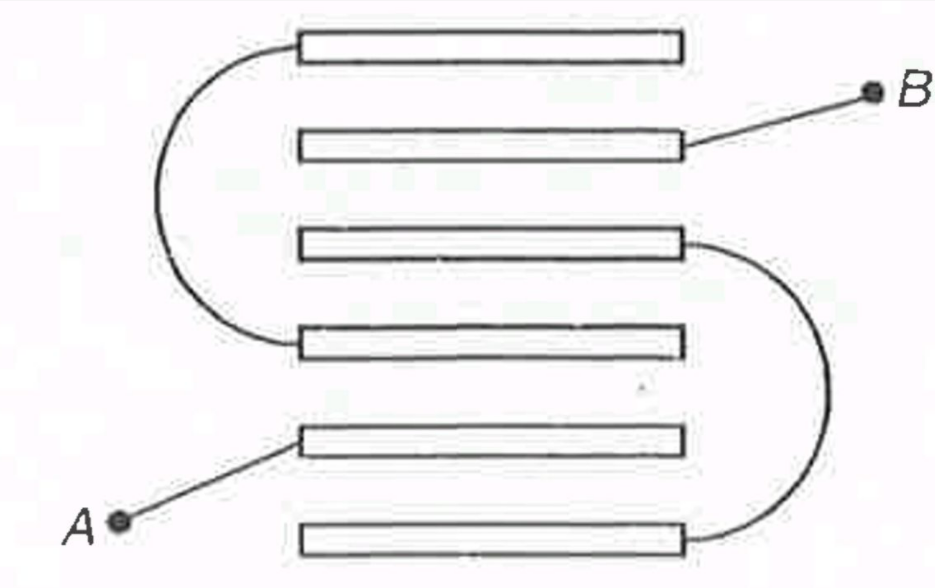
View SolutionThe' distance between the plates of a parallel plate capacitor is `d`. A metal plate of thickness `d//2` is placed between the plates. What will `e` its effect on the capacitance.
View SolutionIf dielectric constant and dielectric strength be denoted by K and X respectively, then a material suitable for use as a dielectric in a capacitor must have
View SolutionWhich of the following methods will reduce the capacitance of a parallel plate capacitor ?
View SolutionA slab of copper of thickness y is inserted between the plates of parallel plate capacitor as shown in figure. The separation between the plates is d. If `y=d/4`, then the ratio of capacitance of the capacitor after nd before inserting the slab is

View SolutionA parallel plate capacitor is filled with a uniform dielectric , maximum charge that can be given to it does not depends upon
View SolutionTwo spherical conductor A and B of radii a and b (`bgta`) are placed concentrically in air. The two are connected by a copper wire as shown in figure. The equivalent capacitance of the system is

View SolutionThe capacity of an isolated sphere is increased n times when it is enclosed by an earthed concentric sphere. The ratio of their radii is
View SolutionThe capacitance of capacitor of plate areas `A_1` and `A_2` (`A_1 ltA_2` at a distance d is

View SolutionConsider the following four arrangement of spherical shell of radius `a` and `b` (a<. Then which of the following holds good for the value of their capacitances?
View Solution
Example questions and complete solutions for chapter Mock Test 25: PHYSICS of AAKASH INSTITUTE ENGLISH of Class 12